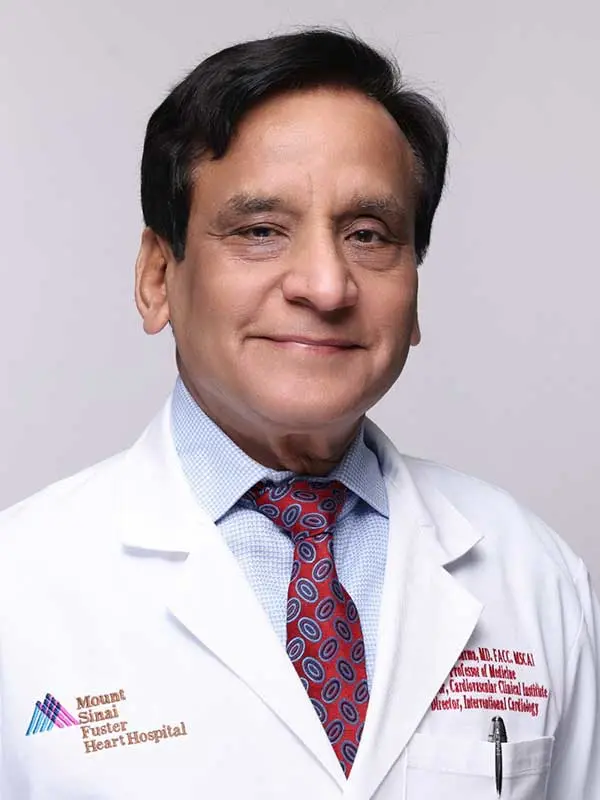Mount Sinai Heart at The Mount Sinai Hospital has earned the American College of Cardiology’s Transcatheter Valve Certification. Mount Sinai is the only cardiac center in New York City and one of three in New York State to receive this recognition. This award recognizes expertise, quality and safety of care, and commitment to treating patients who need transcatheter aortic valve replacement (TAVR).
The award follows a “high performing” rating in transcatheter aortic valve replacement from U.S. News & World Report. This rating is based on multiple categories, including patient survival, patient volume, and stroke prevention.
“It is an absolute honor that we have received Transcatheter Valve Center certification from the American College of Cardiology after a very detailed review of our structural heart program. This certification solidifies Mount Sinai Heart as one of the premier centers in the nation for percutaneous nonsurgical valve procedures,” says Samin K. Sharma, MD, Director of Interventional Cardiology, The Mount Sinai Hospital, and Anandi Lal Sharma Professor of Medicine in Cardiology, Icahn School of Medicine at Mount Sinai.
To earn the certification, Mount Sinai Heart underwent a rigorous nine-month evaluation in which reviewers from the American College of Cardiology conducted an analysis of key areas including:
Quality of care
Clinical outcomes and patient experience
Quality assessment and performance improvement initiatives
Multidisciplinary approach and shared decision making by heart team for patient care
Review of metrics from national registries
Staff credentialing, training, and education
Equipment safety and inspection
Infection control guidelines
“Our center, through a combination of technically skilled operators and careful attention to patient details, has achieved the best outcomes. Regular communication with patients’ families and the referring physicians has made us a preferred center for transcatheter valve therapies,” says Annapoorna S. Kini, MD, Director of the Cardiac Catheterization Laboratory at The Mount Sinai Hospital , and the Zena and Michael A. Wiener Professor of Medicine.
The American College of Cardiology Certification also reflects the close collaboration and active involvement including interventional cardiologists, cardiac surgeons, imaging specialists, heart failure specialists, and nurse practitioners, says Gilbert Tang, MD, MSc, MBA, Surgical Director of the Structural Heart Program at the Mount Sinai Health System, and Associate Professor of Cardiovascular Surgery, Icahn School of Medicine.
In another recognition of Mount Sinai Heart’s excellence in minimally invasive care, two cardiac catheterization laboratories received the highest two-star safety ratings from the New York State Department of Health for percutaneous coronary interventions (PCI). The awards to the labs at The Mount Sinai Hospital and Mount Sinai Beth Israel marked the 22nd consecutive year that a Mount Sinai catheterization laboratory or its physicians have been awarded the designation for PCI safety rates that significantly exceed the statewide average.
The data released by the Department of Health reported on the outcomes of patients who were discharged from all 65 statewide cardiac catheterization labs from December 1, 2014, to November 30, 2017. The “Percutaneous Coronary Interventions (PCI) in New York State 2015-2017” report tracked PCI data in overall, non-emergency, and emergency cases, along with individual physicians.
In the report, Pedro R. Moreno, MD, Professor of Medicine (Cardiology) at the Icahn School of Medicine, and Director of Quality Assurance at Mount Sinai Heart, ranked first in safety for all cases combined, meaning that he had the lowest mortality rates of all interventional cardiologists in New York. Dr. Moreno performed 763 PCI procedures at The Mount Sinai Hospital and Mount Sinai Morningside during this three-year period and achieved a risk-adjusted mortality rate of 0.17 percent, which is 10 times better than the state average of 1.17 percent. Dr. Moreno also received the two-star rating for the non-emergency PCI category with a risk-adjusted mortality rate of 0.12 percent, compared to the state average of 0.79 percent.
During the three-year period, the Cardiac Catheterization Laboratory of Mount Sinai Heart at Mount Sinai Beth Israel (MSBI) was ranked best in the state for achieving higher safety and survival rates than the statewide average for non-emergency PCI cases. It was also one of three hospitals in the state to receive the two-star safety rating for PCI in the non-emergency category. MSBI’S risk-adjusted mortality rate for all non-emergency cases (0.36 percent) was significantly lower than the statewide average (0.79 percent).
“This achievement is the result of years of intensive work devoted to create a superb and safe environment for PCI, where patients thrive with excellent outcomes,” Dr. Moreno says. “At Mount Sinai Heart’s catheterization laboratories, we create and constantly update strict, comprehensive, system-wide protocols orchestrated to achieve the best outcome for our patients. Furthermore, the hospital leadership has implemented a firm quality assurance program to guarantee absolute transparency and constant improvement in our care.”
In addition, the Cardiac Catheterization Laboratory at The Mount Sinai Hospital was awarded the two-star safety rating for low hospital readmissions following PCI in 2017. The Mount Sinai Hospital’s risk-adjusted readmission rate is among the lowest in the state (6.46 percent of patients), and significantly lower than New York’s average of 8.95 percent. The Mount Sinai Hospital had the highest volume of PCI cases for this three-year period, and its catheterization lab was one of six to receive this prestigious ranking for low readmissions.
“These rankings uphold the fact that Mount Sinai Health System’s Cardiac Catheterization Laboratories have been treating our interventional patients with utmost care and success," Dr. Sharma says. “This results in good outcomes, including significant low mortality and 30-day readmission rates.”
Featured

Annapoorna S. Kini, MD
Director of the Cardiac Catheterization Laboratory at The Mount Sinai Hospital, and the Zena and Michael A. Wiener Professor of Medicine

Samin K. Sharma, MD
Director of Interventional Cardiology, The Mount Sinai Hospital, and Anandi Lal Sharma Professor of Medicine in Cardiology